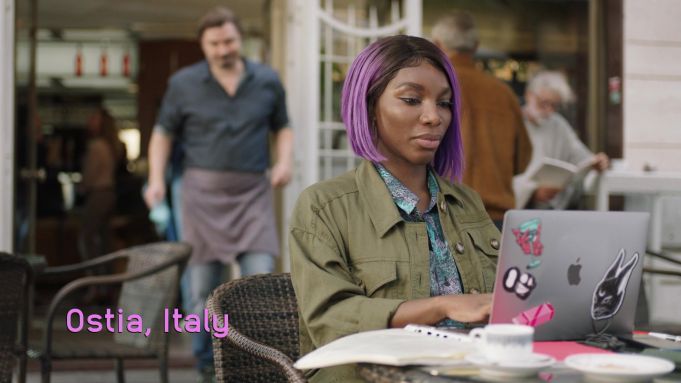Did Italian director Pier Paolo Pasolini inspire the story of the most talked about series of the moment?
In the British series from the BBC One and HBO, the audience never sees the eternal Rome with its monuments, but instead its peripheral appendix Ostia, the extension of small buildings on the Tyrrhenian coast, the beach stands, trashy nightclubs, like those found everywhere in Italy.
Not Rome but Ostia
I May Destroy You, the new series written, directed and interpreted by the talented Michaela Coel, begins in the streets of Ostia, a southern suburb of Rome. A curious choice of set. The sand dotted with colorful umbrellas, the bars, and the nameless park where a pick- up game of basketball is always being played are more reminiscent of teen summer scenarios of some Netflix productions.

But, if you look closely, those little parks and streets are the places inhabited by poor immigrants, places haunted by Pasolini’s ghost. The name Pier Paolo Pasolini is linked to the city of Ostia and the dark night of November 1975, when his murdered body was discovered on the beach. Pasolini and Ostia, however, are not united only by this.
Behind the imposing silhouette of death, there are more artistic and less bloody ties; seeds germinated on the asphalt of a land that abruptly changed together with Italy. The beaches and the streets of Ostia host the footprints of Pasolini himself and the artistic footprints of his "apostles", so to speak; of those who have handed down his words and reflections.
I May Destroy You
And here we are: I May Destroy You is the story of a tragic body, a violated body, that of Arabella Essiedu, a London- based writer of Ghanaian origin who in the midst of a creative stasis decides to go on vacation to the Roman coast in search of inspiration. She jumps in a cab, on her way to the airport. She has to hurry back to London to deliver a draft to the publishers who are pressing her, returning from an alcohol and dancing- fueled vacation in Ostia, with the handsome Biagio (played by Marouane Zotti, a twenty-two-year-old actor born in Venice of Arab parents) planted in her head.
Pasolini
It is clear from the start, however, that despite the fact that the episodes are full of stories and memories that intertwine, it is the body, or rather bodies, that is the focus of the narrative. Echos of Italian director Pier Paolo Pasolini enter into the frame. This is where his idea that “An artist, if he's unselfish and passionate, is always a living protest” intersects with the greatness of Michaela Coel, in portraying a terrible experience lived by the author herself.
Michaela Coel
"It took me two and a half years to write it, and that's all I did in all that time," Michaela Coel said in an interview. Michaela at that time was working on writing the second season of the popular television comedy Chewing Gum. One evening, to distract herself, Michaela went out for a drink with an acquaintance. The next morning she woke up groggy and, at least at first, unable to remember what had happened. The truth of the facts gradually emerged in her memory, brick by brick, in the form of sudden, painful flashbacks. The man had poured a drug into her drink to then abuse her body, her confidence as a woman and friend (according to the BBC, between 2015 and 2019 in England and Wales complaints related to so-called 'drink spiking' were 2,650). The character of Arabella, embodied by Michaela herself with histrionic awareness of her expressive means, represents her catharsis.

ph: Michaela Coel
The body as the protagonist is exposed, wounded, scarred. Perhaps, it is not too far of a reach to see Coel’s process in the words of Pasolini, who said to director Sergio Citti when they were making the film Ostia, “Something you need to say, say it like you know how to say it”. Being a woman, being young, being black, and not being what others, men, adults, expect you to be are all at play. The series unfolds the arguments of the #MeToo movement without becoming its manifesto. And while we understandably hate trap, it's impossible not to admit that Michaela Coel has nailed the soundtrack of our accelerated time.
I May Destroy You is about (emotional) destruction yes, but also about rebirth and survival. A cathartic tale for its author/protagonist but also for all viewers who have found themselves in her identical situation. "The series revolves around that moment when your consent has been stolen and you've lost the power to make a decision. Pointing fingers and blaming yourself is the most pointless thing," Coel told the BBC, "We need to be kinder to ourselves and forgive ourselves for the moments when we didn't say 'No' loud enough.”


















